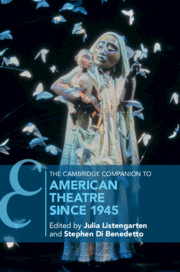Book contents
- The Cambridge Companion to American Theatre since 1945
- Cambridge Companions to Theatre and Performance
- The Cambridge Companion to American Theatre since 1945
- Copyright page
- Contents
- Notes on Contributors
- Acknowledgments
- Introduction
- Part I Commercial and Mainstream Theatre
- Part II Regional Theatre Movement
- Chapter 5 Money Matters
- Chapter 6 When and Where They Enter
- Chapter 7 El Jardín Mágico
- Part III Experimental Theatre and Other Forms of Entertainment
- Index
- References
Chapter 7 - El Jardín Mágico
Commissions, Collaboration, and New Play Development in American Regional Theatre
from Part II - Regional Theatre Movement
Published online by Cambridge University Press: 20 August 2021
- The Cambridge Companion to American Theatre since 1945
- Cambridge Companions to Theatre and Performance
- The Cambridge Companion to American Theatre since 1945
- Copyright page
- Contents
- Notes on Contributors
- Acknowledgments
- Introduction
- Part I Commercial and Mainstream Theatre
- Part II Regional Theatre Movement
- Chapter 5 Money Matters
- Chapter 6 When and Where They Enter
- Chapter 7 El Jardín Mágico
- Part III Experimental Theatre and Other Forms of Entertainment
- Index
- References
Summary
Play development in the American regional theatre is a collaborative relationship between artistic directors, dramaturgs, literary managers, playwrights, directors, actors, and designers. Within this system artistic directors commission work and provide a “magic garden” where playwrights develop material from workshop through theatrical production; this is exemplified by Lauren Gunderson, who writes traditional plays appealing to America’s heartland; avant-garde director/playwrights Carey Perloff and Joanne Akalaitis, who develop challenging work from classic and contemporary sources; and Latinx playwright Elaine Romero, who has navigated this network for more than twenty years as a resident playwright. New York City is no longer the major incubator of new work; instead collaborative play development programs of regional theatre organizations as the Arena Stage, the American Conservatory Theatre, the Goodman Theatre, the Eugene O’Neill Theatre Center, and Chicago Dramatists dominate. Despite the harsh economic realities faced by playwrights, the regional theatre culture of commissions, residencies, development, and foundation support provides salaries, health care, and benefits to artists.
- Type
- Chapter
- Information
- The Cambridge Companion to American Theatre since 1945 , pp. 179 - 204Publisher: Cambridge University PressPrint publication year: 2021

